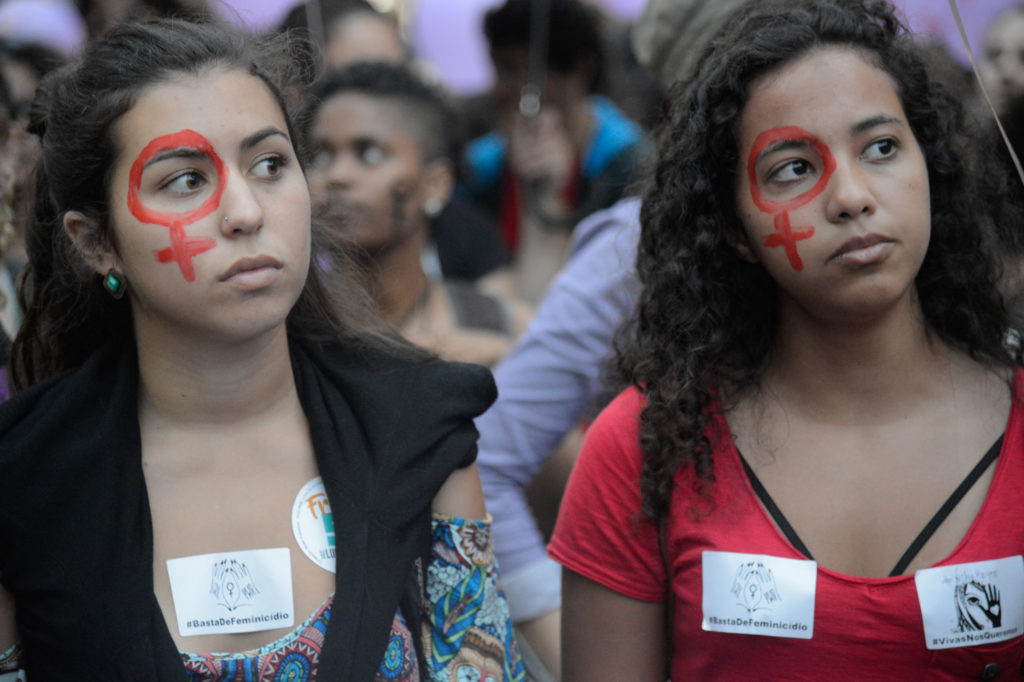RIO DE JANEIRO, BRAZIL – The report from the Forensic Medical Institute on the death of Judge Viviane Vieira do Amaral made it clear that the killing was a hate crime. According to the expert, of the 16 stab wounds that killed her, ten of them were delivered to the face. The magistrate was murdered by her ex-husband in front of her three daughters on Christmas Eve.
At least five other women had a similar fate during the Christmas holiday, in cases that gained media repercussion – the number may be even higher. This barbarity is shocking, but it does not surprise those who monitor the situation of violence against women in the country in a year in which femicides grew by almost 2% in the first half of 2020, totaling 648 cases according to data from the Brazilian Yearbook of Public Safety.
In the most critical months of the pandemic, between March and April, the rise was even higher: in São Paulo the number of women murdered by their partners or ex-partners rose 41.4% in the period.

The death of Viviane and the other victims murdered the day before Christmas or on the holiday itself (Thalia Ferraz, 23, Evelaine Aparecida Ricardo, 29, Aline Arns, 38, Anna Paula Porfírio dos Santos, 45, and Loni Priebe de Almeida, 74), exposed the structural machismo that permeates society and institutions, and that gains ground in the country in a context in which the President himself is notorious for his misogynistic attitudes – “you don’t deserve to be raped,” said then Federal Deputy Jair Bolsonaro to a female colleague in 2014.
The President’s most recent attack on women occurred last Monday, when he demanded that ex-president Dilma Rousseff present an “x-ray” to prove that she was a victim of torture and had her jaw broken during the military dictatorship.
The occurrence of these crimes at the end of the year is no mere coincidence. Prosecutor Gabriela Mansur points out that situations of violence against women tend to increase during holidays and important dates such as Carnaval, Easter, Christmas, and New Year.
“There is an aspect of family reflection and sadness, people become more sensitive, and often men who are separated from their wives because they are aggressive or abusive feel even angrier towards their ex-partner as if they were the ones to blame for their separation and estrangement from the family,” she explains.
The murder of these six women triggered a strong reaction in public opinion, which forced the judiciary to take action that transcended notes of repudiation and solidarity with the victims’ relatives and friends. The National Council of Justice (CNJ) working group responsible for preparing studies and proposals to address domestic and family violence against women called an extraordinary meeting on Saturday to discuss proposals to reduce the problem.
In a note, the body suggested “the typification of stalking crimes – repeated and obsessive persecution – and psychological violence against women, as well as the increase of penalties for threatening, insulting, and bodily injury crimes” against women. “In most cases, these crimes precede the practice of feminicide and need an appropriate criminal reaction in an effort to prevent the escalation of violence,” said Tânia Regina Silva Reckziegel, coordinator of the CNJ group.
The Supreme Court also seemed to be moved by the deaths. In a note after Viviane and the other victims’ murder, Chief Justice Luiz Fux released a note stating that “the reflection on which measures are needed to prevent this tragedy from destroying other homes, from embarrassing us, from making us question the effectiveness of the law and of actions to confront violence against women must be redoubled, multiplied and strengthened.”
But if in theory (and in the notes of sympathy) the STF has shown itself committed to preventing femicides and other forms of violence against women, the court has been criticized in the matter. In September, the First Panel of the Supreme Court ruled, by 3 votes to 2, that there would be no grounds for appealing a 2017 jury trial decision that acquitted a man who confessed to having tried to kill his ex-partner by stabbing her after uncovering an alleged affair.
In addition to the defendant’s confession, there was plenty of evidence of attempted murder, which did not convince the STF to overturn the lower court ruling.
This is a complex discussion that calls into question the sovereignty of a jury verdict; in Brazil, only crimes of homicide have trial by jury, whose verdict is final. Legal and gender experts claim that the Justices’ decision paved the way for other femicides to use the “defense of honor” argument as a justification for the murder of women, which would further aggravate the picture of gender-based violence in the country.
“Our Supreme Court can’t accept acquittal based on ‘legitimate defense of the honor,’ overlapping the principles of popular jury sovereignty and the jury’s profound belief in the principle, also constitutional, of the dignity of the human person, in the case of women, a value expressed in the 1988 Federal Constitution as one of the foundations of democracy,” wrote professors Silvia Pimentel and Fabiana Cristina Severino and attorney Leila de Andrade Linhares Barsted in an article for EL PAÍS.
The authors recalled that the fight against the argument of legitimate defense of honor was a milestone in the feminist mobilization against impunity with the campaign “he who loves does not kill!” for the punishment of the murders of Eliane de Grammont, in São Paulo, Heloisa Ballesteros, in Minas Gerais, Cristhel Arvid Johnston and Angela Diniz, in Rio de Janeiro, which had an impact on the mass media in the late 70s and early 80s.
At the request of Justice Alexandre de Moraes, the Supreme Court will debate in a plenary session whether or not a jury verdict is final and immutable in all cases, or whether a judge can convict a defendant “non obstante veredicto” – notwithstanding a verdict of not guilty. The date for the review has not yet been scheduled and depends on Chief Justice Luiz Fux to be set.

Structural Machismo in the Judiciary
While waiting for this outcome, daily life in the judiciary continues to accumulate cases of misogyny and violence against women. During an online hearing concerning a claim for failure to pay child support, Judge Rodrigo de Azevedo Costa, from one of the São Paulo capital’s family courts, joked about the Maria da Penha Law and attacks on women.
“If there is a Maria da Penha law against the mother, I don’t care. One thing I have learned in my life as a judge: no one attacks anyone for no reason,” said the magistrate during the session. The case was disclosed by the website Papo de Mãe from UOL. After the videos were released, Judge Costa became the target of an investigation by the Internal Affairs Department.
Before that, the case of influencer Mariana Ferrer had already exposed the difficulties a woman faces when saying she was a victim of rape. The case allegedly occurred in a nightclub where she worked, in Florianópolis, in December 2018. During the trial in November this year, the attorney for defendant André de Camargo Aranha insulted Ferrer, claiming that she took sensual pictures in “gynecological” positions, and claiming that “her livelihood is the misfortune of others [by] manipulating this virgin story,” among other atrocities.
Defendant Aranha was ultimately acquitted, given that the prosecutor in charge of the case claimed that there was no way the entrepreneur could have known, during intercourse with the young woman, that she was in no condition to consent to the relationship. In other words, there was no intent to commit the crime of rape, an argument the judge accepted.
“This institutional gender-based violence against women committed by members of the judiciary in positions of power has always existed,” says prosecutor Mansur. With the pandemic and online hearings, which could be recorded, this “was exposed”. Not specifically mentioning the case of Magistrate Costa, who is being investigated, she states that behaviors such as these “prevent women from seeking the necessary help, and place them at risk.”
“When a woman goes to court, she has already suffered other kinds of violence: she must be protected and welcomed with respect and dignity. Women are being violated in their right to take legal action, to have access to the justice system, which is being hindered by institutional gender violence, pervaded by institutional machismo,” she says.
Despite these “institutional violence” cases by the Judiciary against women, Mansur states that they are a minority. “We have many professionals committed and engaged with the issue of violence against women, and this is growing. They are good committed professionals, who cannot have their image destroyed because of the conduct of a few.”
The classification of stalking and psychological violence against women as specific crimes, as well as hardening of penalties for gender violence, are measures advocated by Cristiana Bento, a former detective and current undersecretary of Women’s Policies for the State of Rio de Janeiro – where two of the six femicides occurred this Christmas. “But we must start in school, with the children. We insist that there should be a specific subject, a compulsory subject that addresses gender violence. It’s our fight with the legislature,” she says.
In her opinion, there is no short-term solution to the problem. “No country can place a police officer on the doorstep of each victim. That’s why I think we need to stop the chauvinist and patriarchal culture that permeates our institutions. It is necessary to break with this machismo that sees women as objects, and this is also achieved through education.”
Source: El País

